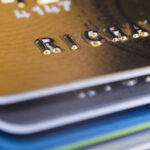How many credit cards do you have in your wallet? If you can’t remember, that’s a sign you might be addicted to credit cards and consumed with debt.
Throughout the years, American consumers have heavily relied on credit cards to cover expenses large and small. According to recent statistics, the average household in 2022 carried over $8,900 in credit card debt, a 4.5% increase from 2021.
So, it should come as no surprise that many people are struggling with debt. And that doesn’t include personal loans, auto loans, student loans, or mortgages. When you add it all up, Americans owed approximately $31.419 trillion in debts as of December 2022. This is a slight increase from about $29.617 trillion the previous year.
Wondering if you might be a credit card addict? Here are 10 things to look for.
1. Denial Isn’t Just A River In Egypt
Being in denial about your excessive credit card use is one of the biggest signs you’re addicted to them. If you don’t know the amount of your outstanding balances and you are just paying the monthly minimums, the odds are that credit cards have you under their spell.
2. You Can’t Live Without Your Cards
When you think about your credit card being lost or stolen, what is the first thing that comes to mind? Stress that someone might find the card and fraudulently use it? Or does your mind go straight to panic because it would mean losing your only source of discretionary income? While this is a valid reason, man (and woman) cannot live by credit cards alone. It’s important to always have an alternate payment source to fall back on.
3. You’re Constantly Applying For New Cards
Do you fill out an application every time you see a juicy credit card offer? Maybe you are tempted by the card’s perks or perhaps your other credit cards are maxed out. Having multiple cards can work in your favor, but only when you handle them responsibly. You have too many credit cards if you can’t pay off the monthly balances.
4. You Add More Debt To Pay Bills
Are you taking out high-interest cash advances from a credit card to pay a bill? In other words, are you robbing Peter to pay Paul? If you’re using any possible method to pay your bills regardless of the interest incurred, you need to put the credit cards away and start paying down your balances.
People Also Read
5. You Ignore Rises In APRs Or Fees
When you read the fine print about an increase in your APR or fees, do you turn a blind eye? You may end up paying hundreds or thousands more in high-interest or late-payment fees in the end. It’s important to carefully read whatever updated information is sent by the credit card company.
6. You Keep Your Debt A Secret
When the subject of credit cards comes up, do you try to change the subject? Maybe you’re keeping your credit card spending a secret from your significant other. For example, you may hide your credit card bills as soon as they roll in. Do you do the same thing with any correspondence you receive from your credit card providers? Hiding your credit card statements and correspondence can be considered financial infidelity, which could ultimately hurt your marriage or relationship.
7. You’re A “Good Deal” Shopper
If you come across a good deal, is it too good to resist even though you must put it on your card? Let’s face it, there’s a good chance you have an excess of unused “good deals” piling up at home. Before making an impulse purchase, ask yourself if you truly need the item and if you would regret not purchasing it. Odds are that the answer will be “no” a lot more often than “yes.” Instead, use the money to pay down your credit card debt or make a necessary purchase.
8. You Have Limited Cash On Hand
If you are overly dependent on your credit card, you might not see the importance of creating a savings account. Instead, you’ll reach for that card in times of financial need. Whenever possible, you should avoid using your credit card if you can’t cover the balance when it’s due. A savings account, like an emergency fund, can bail you out without adding to your debt.
9. Your Credit Card Balances Are Spiking
You’re in the minimum payment trap but it doesn’t matter because you are still not thinking twice before swiping a card. Plus, your balances are so high that if you thought about them, you could spend your nights wide awake with worry. This is a telltale sign that your credit card spending is out of control.
10. You’re Totally Tapped Out
Have you maxed out all your credit cards? Unless this is the result of a serious emergency, there is no excuse for this to happen. It’s a clear indication that your spending is out of control. If you can’t afford it, don’t buy it.
What You Need To Do
If you answered, “yes” to some of these questions, you might be a credit card addict. Careful—you may find yourself in serious financial trouble or even bankruptcy if you don’t break this habit. So, what can you do? Try cutting back on your credit card usage for as long as possible. This might be challenging at first, but it will greatly benefit you in the long run.
Get Your Debt Under Control
Once you get your credit card use under control, it’s important to pay off your debts. If the task seems overwhelming, you might want to seek help from a nonprofit credit counseling agency. Their experienced counselors will review your spending and income to help you devise a debt management plan for getting your debt under control.
In some cases, they will work with your creditors to reduce your interest rates so you can put more towards the principle and work towards resolving your debts. If you haven’t already cut back on your credit card usage, the counselor may insist that you do so to get results.
If you haven’t already created a household budget, now is the time. There are numerous budgeting tools and apps available—many of which are free. For example, Mint is a free financial management tool that will track your spending to help you see how much is going out every month. They will even send you email alerts if you overspend in any of your itemized categories.
Create An Emergency Fund
If you no longer have credit cards to fall back on in the event of an emergency, you’ll need to create an emergency fund. Most financial experts recommend saving the equivalent of at least three months’ worth of living expenses, although six months is better. Naturally, you won’t be able to create this fund overnight. Your goal should be to save at least 10% of your income every month.
As the savings add up, you could potentially have a fully funded emergency account in a year or less. If you have trouble saving money, you could arrange to have a small amount of your paycheck automatically deposited into the account each payday. You might also want to open a second savings account to cover a one-time expense such as that automobile maintenance bill you know is coming up in a few months.
By setting aside a small portion of your paycheck every month, you will be prepared for expected and unexpected expenses without wreaking havoc on your budget. Aside from the suggestions herein, we can help you in your efforts to resolve outstanding debt in a shorter amount of time than simply making minimum payments. Our debt coaches also share tips and advice on healthy spending habits, including ways to use your credit card less.









